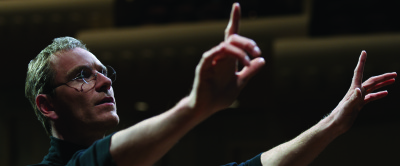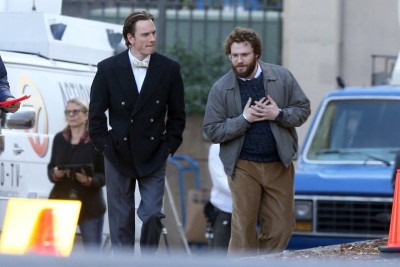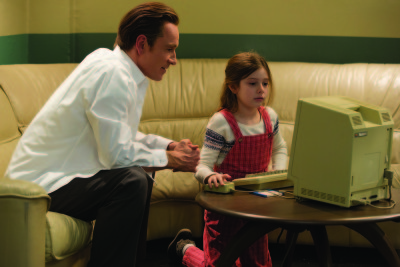Steve Jobs is a strange duck of a film – a look at three pivotal moments of the Apple genius’ life in the hope that it will give a full picture of the man.
The three moments are the backstage events prior to three key launches of Jobs’ products: 1984’s Mackintosh, 1988’s NEXT computer and 1998’s iMac.
Written by Aaron Sorkin (The West Wing, The Social Network), Steve Jobs is – as you might expect – a dialogue heavy movie. Very few moments pass without someone saying something – and Sorkin’s trademark walk-and-talks are plentiful.
Danny Boyle (Slumdog Millionaire, Trance) delivers a spritely film that moves with an agility that matches Sorkin’s dialogue beautifully.
The problem is that despite its warts and all (heavy on the warts) look at Jobs (Michael Fassbender) in these key situations, the film never shows us enough of what Jobs may (or may not) have been to make statements like Steve Wozniak’s (Seth Rogen) to the effect that he’s known Jobs long enough to know that this persona is invented believable.
Make no mistake, Boyle and Sorkin’s Jobs is a near manic perfectionist who refuses to do anything in any way but his own. He’s heedlessly cruel – refusing to accept that he has a daughter with the five-year old Lisa standing RIGHT THERE; shutting down a friend in search of a metaphor by bluntly telling he hasn’t the time to wait for that metaphor to be found; and on and on.
The only person whom he seems willing to be marginally less with is his assistant, Joanna Hoffman (Kate Winslet) – and if you blink, you might miss the few moments where that happens.
By the time we reach the film’s final moments, we get a few moments of what, for Jobs, passes for humanity – by which time, even his daughter isn’t really to acknowledge it.
Overall, I found Steve Jobs to be a brilliant technical work – the film is as precisely made as Jobs could ask for – but only occasionally achieving any genuinely relatable emotional moments from its brilliant cast. Of those occasions, the best are Woz arguing with Jobs in the final sequence of events; Michael Stuhlbarg’s Andy Herzfeld’s refusal to apologise for doing a good thing (also in the final sequences), and Jeff Daniel’s John Sculley explaining to Jobs how he tried to protect him in spite of his (Jobs’) steadfast shooting himself in the foot. Also, one or two of the many times Joanna stands up to Jobs.
Performance-wise, Fassbender, Rogen and Winslet are uniformly brilliant as they whip through Sorkin’s dialogue as though it were the most natural thing in the world. You will forget that Fassbender looks nothing like Jobs within five minutes of the film’s beginning; Rogen could figure in awards talk, and Winslet is almost unrecognizable as Joanna, she melts into the character so thoroughly.
Outside of seeing and hearing a brilliant cast do justice to Sorkin’s writing, not a lot of Steve Jobs is fun, but apparently he wasn’t the world’s biggest fun guy. If that’s the case, then Steve Jobs does a lovely job of capturing that – but it’s like watching a hammer strike an anvil over and over and over. First it’s hot; then it’s cool; then it’s boring.
I’m glad I saw Steve Jobs but I don’t think I would have paid for the privilege. Sometimes technical proficiency – technical wizardry – is just not enough.
Final Grade: B-
Photos by Francois Duhamel/Courtesy of Universal Pictures


